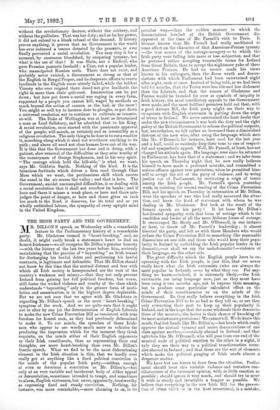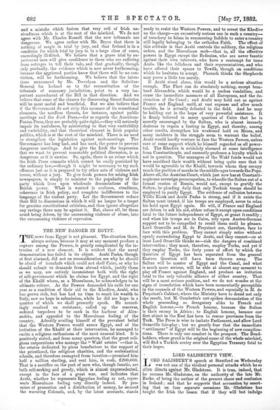THE IRISH PARTY AND THE GOVERNMENT.
MR. DILLON'S speech on Wednesday adds a remarkable feature to the Parliamentary history of a remarkable party. Mr. Gladstone termed it "heart-breaking," and, no doubt, it might easily break a statesman's heart to find an honest Irishman—we all recognise Mr. Dillon's genuine honesty —with the history of the last two years before him, seriously maintaining that the practice of "boycotting" an Irish tenant for discharging his lawful debts and performing his lawful contracts, is legitimate and defensible. That Mr. Dillon should not know by this time that the mutual distrust and fear with which all Irish society is honeycombed are the root of the country's weakness and misery,—that they not only prevent Ireland from gaining her full political freedom, but worse, still foster the wicked violence and cruelty of the class which understands " boycotting " only in the grosser form of muti- lation and assassination, is in the highest degree deplorable. But we are not sure that we agree with Mr. Gladstone in regarding Mr. Dillon's speech as the most " heart-breaking " symptom of the week. And we are quite sure that it ought not to alter by one jot the determination of English Liberals to make the new Crime Prevention Bill as consistent with true freedom for honest men, as they had previously determined to make it. To our minds, the speeches of those Irish- men who appear to use words much more as vehicles for producing the impression which for the moment they think requisite, on the minds either of their English opponents or their Irish constituents, than as representing their real thoughts, are more heart-breaking than even Mr. Dillon's frantic speech. What we find to be the most disheartening element in the Irish situation is this, that we hardly ever really get at anything like a fixed political conviction in the minds of the popular Irish party,—seldom enough at even so ferocious a conviction as Mr. Dillon's,—but only at an ever variable and incoherent body of either appeal or denunciation, sometimes intended to tempt, and sometimes to alarm, English statesmen, but never, apparently, trustworthy as expressing fixed and steady conviction. Nothing. for instance, was more remarkable,—more alarming to us, in its peculiar way,—than the sudden manner in which the denunciations levelled at the British Government dis- appeared at the time of Mr. Parnell's visit to Paris. It became known that Mr. Parnell had really meditated to some effect on the character of that American-Fenian tyranny —the true source of the outrage-mongery — to which the Irish party were falling into more or less subjection, and that he preferred rather accepting reasonable terms for Ireland from Great Britain, than to accept the nightmare yoke of these American Fenians. He had no sooner made his views known to his colleagues, than the fierce wrath and denun- ciations with which Parliament had been entertained night after night, sank at once. Instead of being told, as we had been told for months, that the Tories were less vile and less dishonest than the Liberals, and that the names of Gladstone and Forster would be branded for ever as symbols of iniquity in Irish history, the most conciliatory appeals to the Government were made, and the most brilliant promises held out that, with a good Arrears Bill, the Irish party might see their way to co-operate with English statesmen in putting down the reign of terror in Ireland. We never entertained the least doubt that under the new circumstances it was both the duty and the right policy of the British Government to release the political suspects, but, nevertheless, we felt rather an increased than a diminished distrust of the men who, after using the language which men like Mr. O'Donnell, for instance, have used for the last year and a half, could so suddenly drop their tone to one of respect- ful and sympathetic appeal. Well, Mr. Parnell, at least, has not changed his attitude again. His language, ever since he returned to Parliament, has been that of a statesman ; and we infer from his speech on Thursday night that he now really believes himself to have made a profound mistake, and committed a serious offence against true patriotism, when he permitted him- self to accept the aid of the party of violence, and to wring justice out of Parliament, by instituting a reign of terror among the Irish people. tin Parnell's speech yesterday week, in resisting the second reading of the Crime Prevention Bill, and his speech on Thursday in extenuation of Mr. Dillon, were the speeches of one who had really measured the situa- tion, and knew the kind of statesman with whom he was dealing in Mr. Gladstone. But look at the result of the former speech on his party ? It let loose Mr. Dillon's hot-headed sympathy with that form of outrage which is the condition and feeder of all the more hideous forms of outrage. It encouraged Mr. Healy and Mr. O'Donnell, in one instance at least, to throw off Mr. Parnell's leadership ; it almost bisected the party, and left us with those Members who would reduce the Crime Prevention Bill to something like reasonable dimensions on one side, and those who would keep their popu- larity in Ireland by outbidding the Irish popular leader in the dramatic,—or shall we say the melodramatic ?—violence of their language, on the other side.
The great difficulty which the English people have in co- operating with the Irish people, is just this, that we never really know what the Irish extremists (who are always the most popular in Ireland) mean by what they say. For any- thing we know,—indeed, it is extremely likely,—the Irish extremists are using language now, just as they must have been using it two months ago, not to express their meaning, but to produce some particular calculated effect on the minds of their constituencies or on the minds of the Government. Do they really believe everything in the Irish Crime Prevention Bill to be as bad as they tell us, or are they only overacting their part to keep up their popularity in Ireland, and in the hope that the more wholesale their denuncia- tions of the measure, the better is their chance of knocking off its most unfortunate provisions? We cannot tell. We do know this much, that hot heads like Mr. Dillon's,--hot heads which really approve the mutual tyranny and secret denunciations of one class against another,—certainly abound in Ireland ; and that agitators like Mr. O'Donnell, who will pass from one end of the musical scale of political emotion to the other in a night, if only they see their way to a political transformation scene_ also abound in Ireland ; and that these are the sort of elements which make the political gauging of Irish needs almost a desperate matter. We have but one lesson to draw from the situation. Parlia- ment should treat this variable violence and tentative con- ciliatoriness of the extremist opinion, with as little emotion as possible ; should ignore it very much, and should try to meet it with as steady and invariable a temper as possible. We believe that everything in the new Irish Bill for the preven- tion of crime which is in the least sensational, is a mistake, and a mistake which fosters that very evil of Irish un- steadiness which is at the root of the mischief. We do not agree with Mr. Charles Russell that the new tribunals are dangerous. We agree rather with Mr. Bryce that there is nothing of magic in trial by jury, and that Ireland is in a condition for which trial by jury is, in a large class of cases, exceedingly ill-fitted. We believe that a grave trial by ex- perienced men will give confidence to those who are suffering from outrages to tell their tale, and that gradually, though only gradually, the evidence which is now never forthcoming, because the aggrieved parties know that there will be no con- viction, will be forthcoming. We believe that the inten- tions announced by Mr. Trevelyan and the Solicitor- General for Ireland as to the reconstitution of the tribunals of summary jurisdiction, point to a very im- portant amendment of the Bill in that direction. And we believe that some of the clauses for discovering Secret Societies will be most useful and beneficial. But we also believe that if the Government do not strip this measure of its sensational elements, the needless threats, for instance, against public meetings and the Irish Press,—for as regards the American- Fenian Press, they are probably quite right,—they will seriously impair its usefulness, by ministering to that very excitability and variability, and that theatrical element in Irish popular politics, which is at the root of the mischief. There is no need to strengthen the legislation against mob-meetings. The Government has long had, and has used, the power to prevent dangerous meetings. And to give the Irish the impression that we want to prevent reasonable political discussion, is as dangerous as it is unwise. So, again, there is no crime which the Irish Press commits which cannot be easily punished by the ordinary law,—though it might he necessary to try such offences just as it is proposed to try other acts of violence and terror, without a jury. To give fresh powers for seizing Irish newspapers, is simply to minister to the popularity of the party which lives upon wholesale denunciations of the British power. What is wanted is coolness, steadiness, coherence in Irish policy, and complete indifference to the language of the violent party. Let the Government reduce their Bill to dimensions in which it will no longer be a target for genuine constitutional criticism, and then ignore altogether any ravings there may be against it. But, above all, let them avoid being driven, by the unreasoning violence of abuse, into the unreasoning violence of repression.



































 Previous page
Previous page